Top 5 selling electric cars in Ireland

Written by: Briain Kelly
Published: February 17, 2024
Last updated: October 9, 2025
Reading time: 5 mins
Electric Cars and other electric vehicles are growing share of the motor market in Ireland as the country.
If you are considering buying electric car in Ireland, consider the top 5 selling electric cars.
Electric Cars in Ireland
While diesel and petrol vehicles remain the most common in Ireland, electric vehicles are taking up an ever-growing market share, especially among new cars.
In 2023 there were 22,789 new electric cars registered in Ireland. This represents an increase of 45% on the 15,678 registrations seen in 2022 and is nearly seven times greater than just four years prior in 2019.
Full Battery Electric Vehicles accounted for 18.7% of new vehicle registrations in Ireland last year, compared with 30.07% for petrol and 22.21% for diesel. Battery Electric, Plug-In Hybrid, and Hybrid cars accounted for almost half of the new vehicles market in 2023.
Most Popular Electric Cars in Ireland
The best-selling electric cars in Ireland in 2023 according to industry figures were the Volkswagen ID.4, Tesla Model Y, Škoda Enyaq, Hyundai Ioniq, and the MG MG4.
The overall top-selling Electric Car brands are Volkswagen, Tesla, Hyundai, Kia, and MG.
Note: Prices listed are taken from the manufacturers and may include state subsidies such as grants and VRT relief. Check with the manufacturer for the latest pricing information.
Volkswagen ID.4
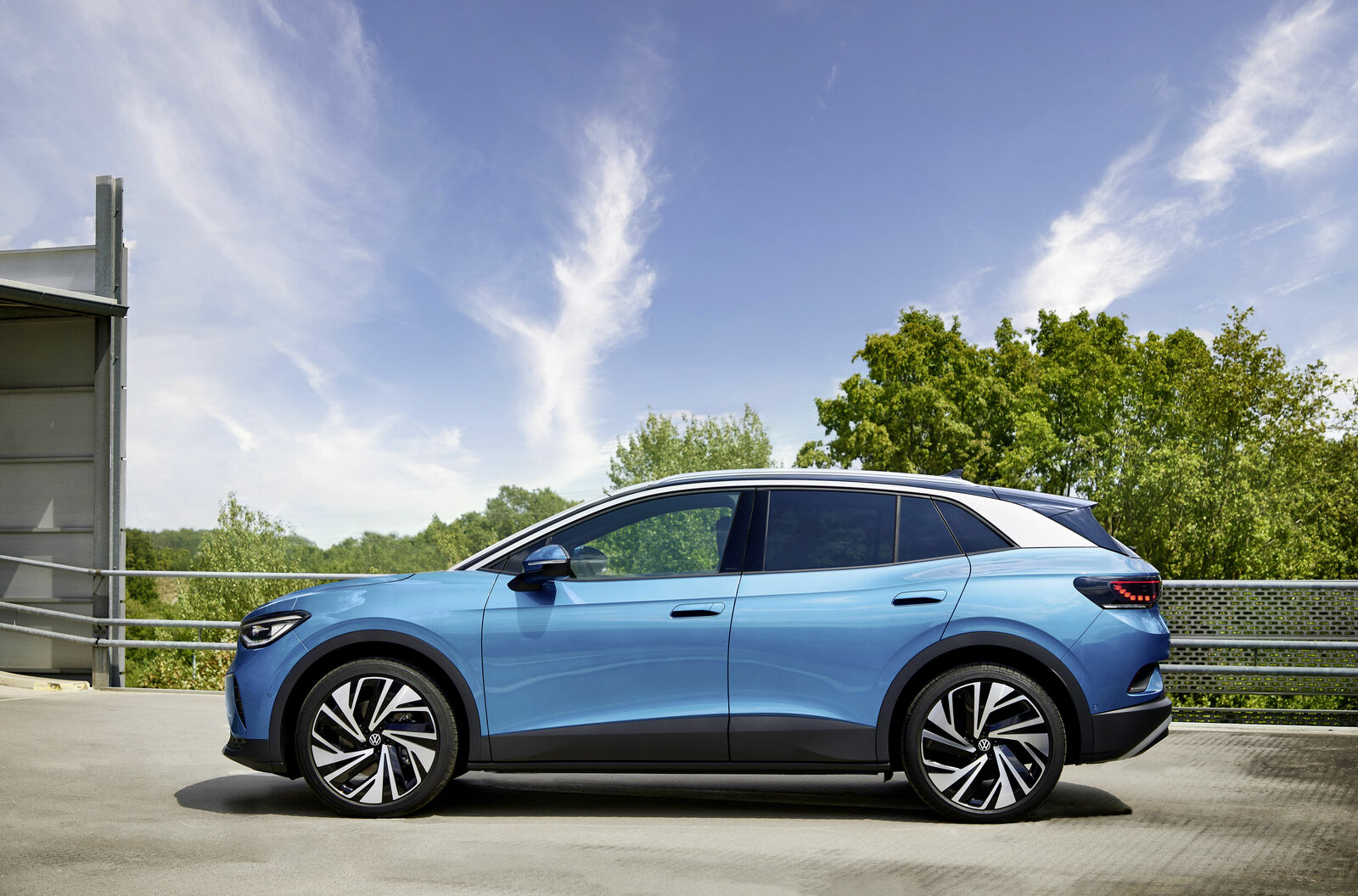
Price From: €38,593
The Volkswagen ID.4 SUV came on the market in 2021 and has remained the favourite electric car in Ireland in the years since. Comes with more space than many electric cars, and has a competitive range and efficiency despite its larger size.
The ID.4 has two main models, with effective battery capacities of 52kWh and 77kWh, which deliver a range of 363 km – 548 km per battery charge depending on the exact model configuration chosen. Electric fuel consumption ranges from 16.1kWh – 16.9kWh per 100km travelled depending on the model.
With a standard 11kW charging station the ID.4 takes approximately 8 hours for a 100% charge.
A popular feature of the ID.4 is an unobtrusive augmented reality heads-up display to help with navigation. This scans the road ahead of the car and takes in data such as speed and programmed destination to provide real-time information projected onto the dashboard, so you don’t have to take your eyes off the road.
Tesla Model YZ
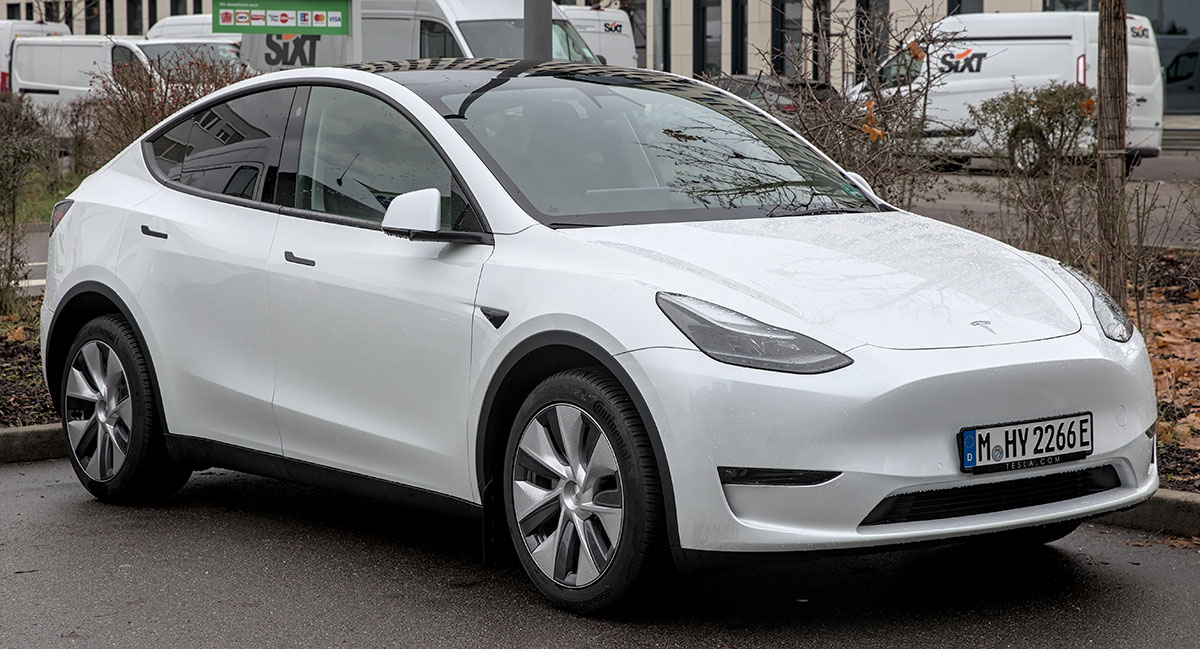
Price From: €50,494
While normally associated with expensive supercars, the Tesla Model Y hatchback is a competitive option in the Irish EV market, with the company announcing price cuts across Europe which could help Irish buyers.
The Model Y has 67.6–81kWh battery options, giving it a range of 430 km – 533 km depending on the model.
The spacious and minimalist interior, along with the all-glass roof option means that you will never feel hemmed in with the Model Y.
Škoda Enyaq
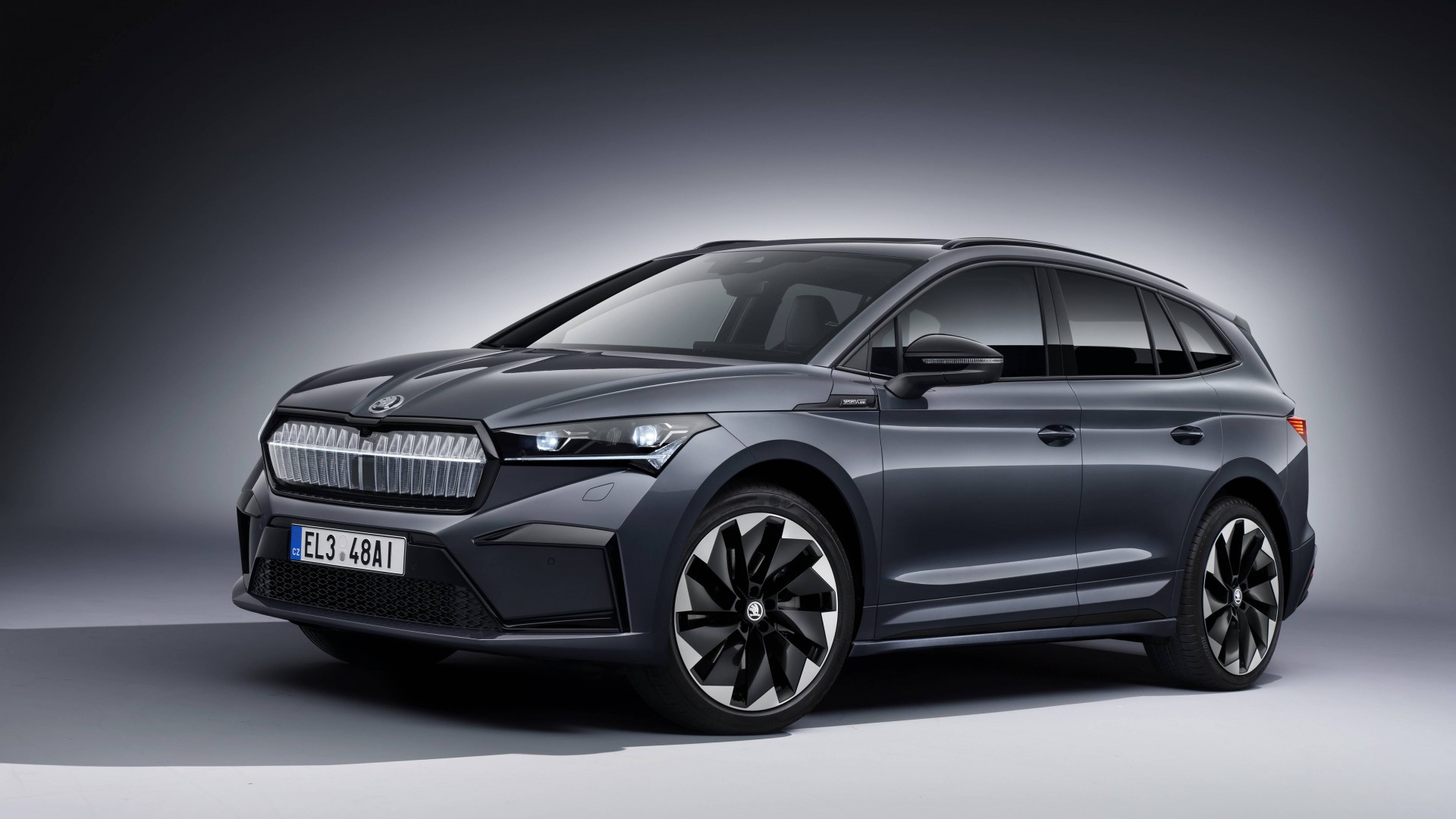
Price From: €51,710
The Škoda Enyaq iV is a popular electric car brand for people looking for comfortable seating and a large amount of rear boot space. Introduced in 2020, the Enyaq was the first battery EV SUV produced by Škoda.
The current Enyaq iV models come with 58kWh and 77kWh batteries which can deliver an effective range of 376 km – 546 km per battery charge. On a standard 11kW home charger it would take between 6hr 15m and 7hr 30m for a complete charge depending on the battery size.
All models of the Enyaq come with extensive storage space and interiors designed for comfort and support, with a mix of classic and sporty designs on different models.
Hyundai Ioniq
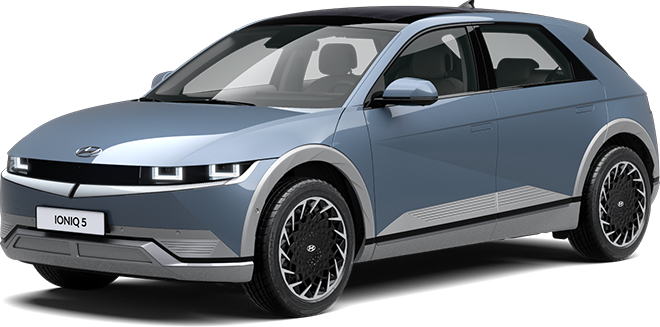
Price From: €44,495
The Hyundai Ioniq 5 was the World Car of the Year in 2022, a year after it was introduced. This compact, all-wheel drive crossover SUV design comes with 58kWh and 77.4kWh battery models which can deliver a range of up to 488 km per charge.
With normal charging on an 11kW charger at home, it will take just over 6 hours for the Ioniq 5 to reach full charge. The stylish interior features an elegant digital display in easy line of site on the dashboard that allows satellite navigation, traffic control and other systems to run simultaneously.
MG MG4

Price From: €29,995
The compact and affordable MG4 is a popular battery electric hatchback which first came to the market in 2022. The MG4 has continued to adapt and improve in the years since, and now features models with three battery sizes of 51kWh, 64kWh and 77kWh in the new Extended Range model.
These can deliver driving ranges of anywhere from 350km up to 520 km in the Extended Range Model. With home charging it takes roughly 7h 30m for the car to reach full charge.
The stylish modern design favours a sporty look on the exterior, and an interior that leans into comfort and simplicity in its controls for easy use and convenience.
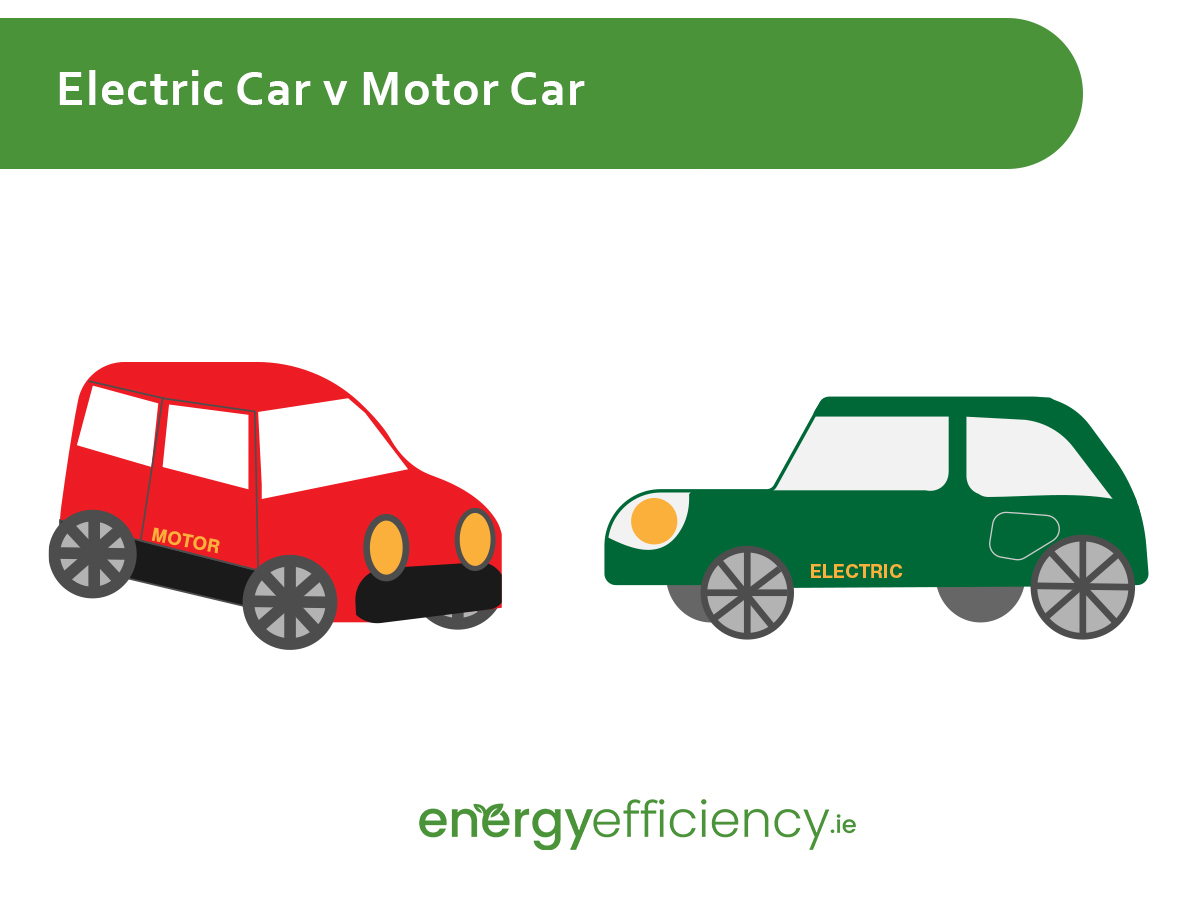
Electric Cars v Motor Cars
Deciding between getting an electric car or a conventional motor car when buying a new vehicle is a big choice. Electric cars have come a long way in recent years but it is still an emerging field.
There are many including:
Electric cars are on average still more expensive than their fuel or diesel counterparts. The difference between them can run anywhere from 10% to as much as 50% depending on the type of car you are buying.
But electric cars do benefit from government subsidies such as grants and tax relief which can help bring down the cost.
The popular Volkswagen ID.4 starts at €42,095, compared with €30,890 for the similar model Taigo with a petrol engine. But after subsidies, the on-the-road price for the ID.4 comes down to €38,593.
There are more affordable options than compact SUVs such as the hatchback Fiat 500 which starts at just €27,495 after subsidies.
Top of the line electric car models can have range of more than 500 km on a single charge. This would allow you to make a round-trip from Dublin to Galway and back on a single charge. However, the majority of models will have a range closer to 350 km on a single charge.
This is still considerably less than petrol of diesel cars would tend to get on a full tank, but is suitable for the majority of people’s needs. With public fast charging stations starting to become more common it is increasingly easy to get a quick boost before fully charging at home..
Hybrid cars are also a great option for people worried about range and charging, with the comfort of having the extra diesel or petrol range if making long journeys.
While charging an electric car might be less convenient than having a petrol or diesel engine, it does work out far cheaper to run.
Taking a Volkswagen ID.4 as an example, as the most popular electric car in Ireland, this consumes 16.1kWh of electricity for every 100 km travelled. So it would use 1,610kWh to travel 10,000km.
For charging at home, taking the current Electric Ireland night rate of 19.39c per kWh, that means 10,000km worth of travel will cost just €312.
A similar petrol car, the Volkswagen Taigo will consume around 5.6l of petrol for every 100km, so 560l of fuel to travel 10,000km. Petrol prices at the pump in Ireland currently average 168c per litre. This comes to €940 for the same distance, more than three times higher than the electric car.
Motor Tax on any vehicles registered in Ireland since 2021 is calculated based on their CO2 emissions of grams per kilometre travelled. Battery Electric Cars pay the lowest possible rate of motor tax of just €120 a year since they have zero emissions.
In comparison, a new Volkswagen Golf with a petrol engine would pay €200, and a Dacia Duster with the same could pay in the €280 or €400 a year tax band.
Grants Available for Electric Vehicles in Ireland
The SEAI provides grants for the purchase of new electric cars with a price between €14,000 and €60,000. The full price of the electric car includes all potential extras such as paint or delivery.
The maximum grant value for private passenger vehicles since mid-2023 has been reduced to €3,500.
| Price of Electric Car | Grant Value |
| €14,000 – €15,000 | €1,500 |
| €15,000 – €16,000 | €2,000 |
| €16,000 – €17,000 | €2,500 |
| €17,000 – €18,000 | €3,000 |
| €1,8000 – €60,000 | €3,500 |
The SEAI also provides grant funding for light commercial electric vehicles, such as small goods carrying vans. In order to qualify for this grant the commercial vehicle in question must not exceed 3,500kg in mass.
| Price of Electric Vehicle | Grant Value |
| €14,000 – €15,000 | €2,000 |
| €15,000 – €16,000 | €2,500 |
| €16,000 – €17,000 | €3,000 |
| €17,000 – €18,000 | €3,500 |
| €1,8000 – €60,000 | €3,800 |
For large panel EV vans with a maximum price of €90,000, the SEAI has a grant of €7,600 available.
VRT Relief
On top of the direct grant funding for new electric cars, new EVs are also eligible for relief from Vehicle Registration Tax (VRT). VRT applies whenever a vehicle is registered in the state for the first time.
In Budget 2024 the government extended VRT Relief for EVs to the end of 2025. Electric Cars with an Open Market Selling Price of up to €40,000 are eligible for up to €5,000 in VRT relief. EVs with a price of €40,000 – €50,000 are eligible for VRT relief at a reduced rate.
There is no VRT relief available for electric cars with an Open Market Selling Price of more than €50,000.
BIK Relief
For the next four years, electric vehicles are also eligible for 0% Benefit-In-Kind taxation. Benefits-In-Kind (BIK), refers to any non-cash monetary benefits provided to employees, such as cars. Typically, when the benefits exceed €1,905 in value in a year, they are subject to taxation.
BIK relief for electric cars has been extended to 2027, though the cash value of that benefit will taper off over the coming years.
- €45,000 in 2024
- €35,000 in 2025
- €20,000 in 2026
- €10,000 in 2027
Top 5 selling electric cars in Ireland
Published: February 17, 2024
Last updated: October 9, 2025

Written by: Briain Kelly
Reading time: 5mins
Electric Cars and other electric vehicles are growing share of the motor market in Ireland as the country.
If you are considering buying electric car in Ireland, consider the top 5 selling electric cars.
Electric Cars in Ireland
While diesel and petrol vehicles remain the most common in Ireland, electric vehicles are taking up an ever-growing market share, especially among new cars.
In 2023 there were 22,789 new electric cars registered in Ireland. This represents an increase of 45% on the 15,678 registrations seen in 2022 and is nearly seven times greater than just four years prior in 2019.
Full Battery Electric Vehicles accounted for 18.7% of new vehicle registrations in Ireland last year, compared with 30.07% for petrol and 22.21% for diesel. Battery Electric, Plug-In Hybrid, and Hybrid cars accounted for almost half of the new vehicles market in 2023.
Most Popular Electric Cars in Ireland
The best-selling electric cars in Ireland in 2023 according to industry figures were the Volkswagen ID.4, Tesla Model Y, Škoda Enyaq, Hyundai Ioniq, and the MG MG4.
The overall top-selling Electric Car brands are Volkswagen, Tesla, Hyundai, Kia, and MG.
Note: Prices listed are taken from the manufacturers and may include state subsidies such as grants and VRT relief. Check with the manufacturer for the latest pricing information.
Volkswagen ID.4

Price From: €38,593
The Volkswagen ID.4 SUV came on the market in 2021 and has remained the favourite electric car in Ireland in the years since. Comes with more space than many electric cars, and has a competitive range and efficiency despite its larger size.
The ID.4 has two main models, with effective battery capacities of 52kWh and 77kWh, which deliver a range of 363 km – 548 km per battery charge depending on the exact model configuration chosen. Electric fuel consumption ranges from 16.1kWh – 16.9kWh per 100km travelled depending on the model.
With a standard 11kW charging station the ID.4 takes approximately 8 hours for a 100% charge.
A popular feature of the ID.4 is an unobtrusive augmented reality heads-up display to help with navigation. This scans the road ahead of the car and takes in data such as speed and programmed destination to provide real-time information projected onto the dashboard, so you don’t have to take your eyes off the road.
Tesla Model YZ

Price From: €50,494
While normally associated with expensive supercars, the Tesla Model Y hatchback is a competitive option in the Irish EV market, with the company announcing price cuts across Europe which could help Irish buyers.
The Model Y has 67.6–81kWh battery options, giving it a range of 430 km – 533 km depending on the model.
The spacious and minimalist interior, along with the all-glass roof option means that you will never feel hemmed in with the Model Y.
Škoda Enyaq

Price From: €51,710
The Škoda Enyaq iV is a popular electric car brand for people looking for comfortable seating and a large amount of rear boot space. Introduced in 2020, the Enyaq was the first battery EV SUV produced by Škoda.
The current Enyaq iV models come with 58kWh and 77kWh batteries which can deliver an effective range of 376 km – 546 km per battery charge. On a standard 11kW home charger it would take between 6hr 15m and 7hr 30m for a complete charge depending on the battery size.
All models of the Enyaq come with extensive storage space and interiors designed for comfort and support, with a mix of classic and sporty designs on different models.
Hyundai Ioniq

Price From: €44,495
The Hyundai Ioniq 5 was the World Car of the Year in 2022, a year after it was introduced. This compact, all-wheel drive crossover SUV design comes with 58kWh and 77.4kWh battery models which can deliver a range of up to 488 km per charge.
With normal charging on an 11kW charger at home, it will take just over 6 hours for the Ioniq 5 to reach full charge. The stylish interior features an elegant digital display in easy line of site on the dashboard that allows satellite navigation, traffic control and other systems to run simultaneously.
MG MG4

Price From: €29,995
The compact and affordable MG4 is a popular battery electric hatchback which first came to the market in 2022. The MG4 has continued to adapt and improve in the years since, and now features models with three battery sizes of 51kWh, 64kWh and 77kWh in the new Extended Range model.
These can deliver driving ranges of anywhere from 350km up to 520 km in the Extended Range Model. With home charging it takes roughly 7h 30m for the car to reach full charge.
The stylish modern design favours a sporty look on the exterior, and an interior that leans into comfort and simplicity in its controls for easy use and convenience.

Electric Cars v Motor Cars
Deciding between getting an electric car or a conventional motor car when buying a new vehicle is a big choice. Electric cars have come a long way in recent years but it is still an emerging field.
There are many including:
Electric cars are on average still more expensive than their fuel or diesel counterparts. The difference between them can run anywhere from 10% to as much as 50% depending on the type of car you are buying.
But electric cars do benefit from government subsidies such as grants and tax relief which can help bring down the cost.
The popular Volkswagen ID.4 starts at €42,095, compared with €30,890 for the similar model Taigo with a petrol engine. But after subsidies, the on-the-road price for the ID.4 comes down to €38,593.
There are more affordable options than compact SUVs such as the hatchback Fiat 500 which starts at just €27,495 after subsidies.
Top of the line electric car models can have range of more than 500 km on a single charge. This would allow you to make a round-trip from Dublin to Galway and back on a single charge. However, the majority of models will have a range closer to 350 km on a single charge.
This is still considerably less than petrol of diesel cars would tend to get on a full tank, but is suitable for the majority of people’s needs. With public fast charging stations starting to become more common it is increasingly easy to get a quick boost before fully charging at home..
Hybrid cars are also a great option for people worried about range and charging, with the comfort of having the extra diesel or petrol range if making long journeys.
While charging an electric car might be less convenient than having a petrol or diesel engine, it does work out far cheaper to run.
Taking a Volkswagen ID.4 as an example, as the most popular electric car in Ireland, this consumes 16.1kWh of electricity for every 100 km travelled. So it would use 1,610kWh to travel 10,000km.
For charging at home, taking the current Electric Ireland night rate of 19.39c per kWh, that means 10,000km worth of travel will cost just €312.
A similar petrol car, the Volkswagen Taigo will consume around 5.6l of petrol for every 100km, so 560l of fuel to travel 10,000km. Petrol prices at the pump in Ireland currently average 168c per litre. This comes to €940 for the same distance, more than three times higher than the electric car.
Motor Tax on any vehicles registered in Ireland since 2021 is calculated based on their CO2 emissions of grams per kilometre travelled. Battery Electric Cars pay the lowest possible rate of motor tax of just €120 a year since they have zero emissions.
In comparison, a new Volkswagen Golf with a petrol engine would pay €200, and a Dacia Duster with the same could pay in the €280 or €400 a year tax band.
Grants Available for Electric Vehicles in Ireland
The SEAI provides grants for the purchase of new electric cars with a price between €14,000 and €60,000. The full price of the electric car includes all potential extras such as paint or delivery.
The maximum grant value for private passenger vehicles since mid-2023 has been reduced to €3,500.
| Price of Electric Car | Grant Value |
| €14,000 – €15,000 | €1,500 |
| €15,000 – €16,000 | €2,000 |
| €16,000 – €17,000 | €2,500 |
| €17,000 – €18,000 | €3,000 |
| €1,8000 – €60,000 | €3,500 |
The SEAI also provides grant funding for light commercial electric vehicles, such as small goods carrying vans. In order to qualify for this grant the commercial vehicle in question must not exceed 3,500kg in mass.
| Price of Electric Vehicle | Grant Value |
| €14,000 – €15,000 | €2,000 |
| €15,000 – €16,000 | €2,500 |
| €16,000 – €17,000 | €3,000 |
| €17,000 – €18,000 | €3,500 |
| €1,8000 – €60,000 | €3,800 |
For large panel EV vans with a maximum price of €90,000, the SEAI has a grant of €7,600 available.
VRT Relief
On top of the direct grant funding for new electric cars, new EVs are also eligible for relief from Vehicle Registration Tax (VRT). VRT applies whenever a vehicle is registered in the state for the first time.
In Budget 2024 the government extended VRT Relief for EVs to the end of 2025. Electric Cars with an Open Market Selling Price of up to €40,000 are eligible for up to €5,000 in VRT relief. EVs with a price of €40,000 – €50,000 are eligible for VRT relief at a reduced rate.
There is no VRT relief available for electric cars with an Open Market Selling Price of more than €50,000.
BIK Relief
For the next four years, electric vehicles are also eligible for 0% Benefit-In-Kind taxation. Benefits-In-Kind (BIK), refers to any non-cash monetary benefits provided to employees, such as cars. Typically, when the benefits exceed €1,905 in value in a year, they are subject to taxation.
BIK relief for electric cars has been extended to 2027, though the cash value of that benefit will taper off over the coming years.
- €45,000 in 2024
- €35,000 in 2025
- €20,000 in 2026
- €10,000 in 2027
Solar Energy Saves Households Thousands in Electricity Costs
Take our 2-minute questionnaire and find affordable solar options to suit your budget and lifestyle.


